Since she was a small child, Ashley Bryant Miller knew she wanted to be an actor. It wasn’t until young adulthood that she knew she wanted to be a member of the Church of Jesus Christ of Latter-Day Saints. Her profession and faith came together when she was asked to be one of the narrators in the “Be One” broadcast in 2018. In this interview, Ashley shares her story of faith, discusses race in the Church and what she has learned from Jane Manning James.
You were not raised LDS. What did your family’s faith and religion look like growing up?
My parents were raised Baptist. Both of them by the time they were married, from what I understand, were fairly casual in their faith and their church attendance. We definitely went to church when I was a child, but we didn’t have a home church. My father’s job was in the military, so we would move to a new place, have a new home, find a new church to go to. Black Baptist church is similar to a black Methodist church, culturally and doctrinally. So we were African Methodist Episcopal—that’s what it’s called.
I was baptized Methodist when I was eight years old, and I chose it. I remember very clearly at the end of every sermon the pastor would say, “Is anyone ready or prepared to accept Jesus Christ in their life and join the church?” And I remember saying to my mom that I wanted to do that. And I remember her getting a little teary, which isn’t common for her. She gets emotional, but it was kind of a sacred emotional. We walked up to the front of the church, and they turned me around and said, “Ashley’s going to do this.” Then I took some classes and was baptized.
What was your first introduction to the Church of Jesus Christ of Latter-Day Saints?
Apparently, my best friend in kindergarten, Wren, was LDS. Mormons were everywhere all throughout the military, so I had Mormon friends growing up. I would go to Bible study during the week. I had a Catholic friend who would do the same thing with her church. And I had my Mormon friends doing Mutual. We’d all go to each other’s things.
It wasn’t until I moved to Utah that religion became an important part of my identity. People around me cared what church I belonged to.
How did you end up in Utah?
My dad was retiring from the military but was still planning to work, as a lot of retired military people do. He had an interview in Salt Lake City and got the job. He was like, “Listen, I thought this city was going to be crazy, but I actually really like it there. People are friendly. Our family likes to ski. What if we moved to Utah?” And I thought “That is just nuts.” But we had moved every two years, and I always kind of enjoyed it, so I went along with it. (As if I had a choice). Once I got there, I felt very strongly that my family was there for a very specific purpose.
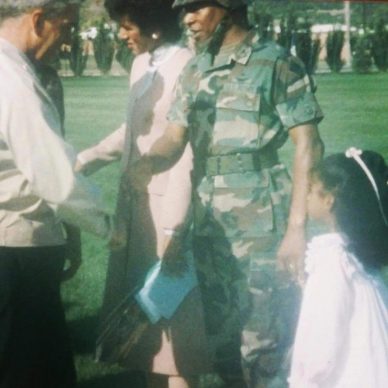
Ashley as a child, with her parents.
What was moving to Utah like for you?
It started with me being bewildered by Mormons. I was as confused by them being Mormon as they were by me being Black—definitely back in 1998, Sandy, Utah was so white. We counted the Black people in the airport, and there were seven, including our family of three. I remember my mom, (this is not her way at all), hearing her on the phone with the cable guy saying “I’m so sorry, are you African-American?” He must have said yes, because then she said, “Can you tell me where you go to church? Where do women you know get their hair done?” He told her.
My first friends and acquaintances saw me as a novelty, not being Mormon. I was asking them questions—What’s that about? What’s that temple? What’s the difference between a temple and a church? Why do you do this? Why don’t you do this? I asked all of those questions. They were a novelty to me too. But what I was learning, I was not excited by. It didn’t feel right. I didn’t like what I was learning. But along the way, I realized there was a difference between the culture that I was experiencing in Sandy, Utah, and the doctrine taught by the Church of Jesus Christ of Latter Day Saints. And once I knew that, then I could start studying. My little community felt weird to me, culturally, but I came to think the Gospel of Jesus Christ as a whole, was beautiful.
When did that shift start to happen for you?
Much like the experience of deciding to be baptized Methodist when I was eight, much like arriving in Utah and feeling like my family was there for a specific purpose.—I should say that it felt divine. It felt like God was a part of it. I remember riding along in the car with some friends. We passed the Jordan River Temple, and I asked, “What do you do there?” My friends were 15 or 16, so they didn’t really know, but they talked about marriage. They said instead of getting married until death do you part, we get married for time and all eternity. And I remember very clearly being in the back of someone’s car, thinking that’s right. That is right. I knew it. I knew it was right. It was like I was remembering something I had forgotten. It wasn’t someone telling me new information. I had never heard it, but I knew it. I remember saying, “That’s what I’ll have the pastor do at my wedding, that’s what he’ll say.” It did spark some interest, and I was curious to know more.
Did you have an idea of what meeting with the missionaries would be like?
In my first year of high school, Jordan, my friend from the neighborhood, asked me if I wanted to meet with the missionaries and learn more, and it sounded really right. In Germany, we had to take a class called Host Nation; it was a class for children of American soldiers that allowed us to learn some of the language and cultures of Germany. I remember thinking this is like Host Nation. There’s a language involved that I don’t know, there’s a culture that I don’t know, and so it was like Host Nation, and I loved that.
I knew missionaries were set apart to do something special. I just expected it to be a class. They showed me pictures, they told me about Joseph Smith, they told me about the First Vision, they told me that God and Christ were two separate beings, and that made a lot of sense to me. Other explanations of God and Christ never made sense to me. So God and Jesus being two separate beings, I was like “Yes! of course they are”.
At the end of the lesson, they asked, “Do you believe that Jesus Christ is our Savior?” I said yes. “Do you believe that Joseph Smith saw God the Father and Jesus Christ?” And I said “Yeah, why would you lie about that? Sure I believe you.” Then they asked, “Would you like to be baptized on Saturday?” And I said “This Saturday? No. What does my believing what you’re telling me have to do with me changing my religion? What you’re saying may be true but that doesn’t mean I have to change my religion (and my life) over it.” And I didn’t. At that time, that wasn’t enough.
I knew it was a big thing they were asking, but I still stand by the fact that everyone should get the time that they need. Some people are very ready right away. I think those people are fewer and farther between than we know. Time is okay. It’s okay to take your time in such a big decision. Same with marriage, sometimes people meet and they know right away, and it works, and we hear those stories. But I was 15 years old and a quick conversion wasn’t going to happen. I had no interest.
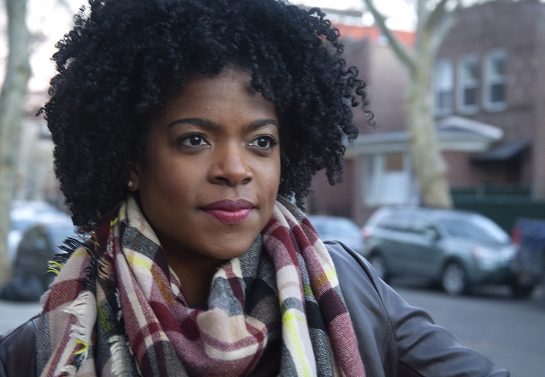
Ashley Bryant Miller
At this time, were you actively working on your relationship with the divine?
I don’t think there was a time when I wasn’t praying. Communicating with God has always been important to me. I’d write in my journal, not consistently, but enough. God and Christ were important to me, but I think it was a bit of a smorgasbord. I would go with my parents to church; I would ask my friends questions.
I know I got a Book of Mormon with glitter pen testimonies from a group of girls, that they gave to me after a sleepover soon after I moved to Utah. I didn’t read it right away. In fact, I probably didn’t open that book (aside from a meeting or two with missionaries) for another two years. But, one night as I was reading—I suddenly became very emotional. Not necessarily joyful emotion. I put the book down and called a friend, while sobbing, and said, “I think I want to be Mormon. No. I think I’m supposed to be Mormon.” I was crying because I didn’t want to be. It’s weird now to think back, but it felt horrible. I felt so scared about it.
Can you remember what was horrible about it?
I knew it was going to change my whole life, that it would change everything. Everything that I had planned was null and void as I understood it. And I think I must have known that it would be hard. It was a sad thing. I was thinking—how will I tell my parents? How will I tell my family? This is insane. These people (Mormons) are weird. I don’t want to do it.
That friend I called came over. He said, “Listen, I’ll get the discussions and we’ll read them together. I’ll ask for them for Christmas, my parents will be thrilled.” And they were. So around Christmas, he came over and we laid them out on the coffee table in our basement. I remember my mom calling down and asking what we were doing. This was my best friend, it was a platonic relationship, and I remember saying “Nothing!” and thinking I’d rather she thought we were making out, because that would be much, much easier to explain than what we were doing.
I learned something about myself through my investigation—I like to know things, decide things and then think about it. Even when I’ve made the decision, I still want to think about that decision, to live in it. So, I paused my study of the Gospel, which I think frustrated a couple of friends, but they stayed patient and continued to answer my questions as I had them. This is where my testimony of the youth comes into play. It was all 15, 16, 17 and 18 year olds that were influencing my life in a very meaningful way, but they may not have known this.
Was it more like ministering? Were they just being friends with you?
Yes. They were just being my friends and just living their lives and their truth. Their unapologetic invitations were helpful. These were all good friends, friendships I would have whether or not I was doing church-related things with them. They were always ready to answer questions, which worked well for me.
I graduated high school and decided to go to the University of Utah. In the acting program there was one LDS student in my class and that was it. It was really nice. I took a class called World Religion. I dated a Catholic guy who was gently pushing me to learn about Catholicism. He gave me his Trinity ring to wear. I had a Buddhist teacher that I really respected, so I went to meditations with him to learn more. For extra credit for the World Religion class I would go to different places of worship. I was all over the place trying to learn. I knew that religion was going to be a big part of my life, so which one? Was my experience with Mormonism going to be it?
Almost like your own Joseph Smith experience.
Totally. That was my first year of college. I loved talking and learning about religion. I didn’t feel any pressure, but I was very interested in figuring it out.
On the top of my list of things to do in my life was to go to Africa. I was by myself eating lunch one day in the Student Union and someone came up to me and asked, “Would you like to go to Africa this summer?” And I said, “Yes, that sounds great.” My grandmother had passed away and left me the exact amount of money that I needed to go. Nearly everyone on the trip was Mormon. I didn’t know that beforehand.
This trip was a volunteer program called “Reach the Children.” I was one of the younger volunteers at 19. We were building a school, literally brick on top of mud, in Uganda near the capital. We were building the school with the students, and we were teaching them classes in the morning. I taught theatre. In the afternoons we would build, then in the evening we would go to members’ homes and have dinner. After dinner, we would sing a song, and the only Mormon hymn I knew was “Because I Have Been Given Much.” We sang that every time because I knew it. We were invited to go to an LDS ward one week. After the meetings, six people were baptized. They were all Ugandans, all Black. Those baptisms helped me understand that The Church of Jesus Christ of Latter Day Saints is truly a worldwide organization. I saw all of these black people be baptized, which was a very, big deal to me, helpful to the point that I even considered being baptized there in the Nile. But I knew my parents wouldn’t be fans of that decision and ultimately, I wanted them to be a part of this change.
The day before we left Uganda we went to an orphanage and spent some time with the babies. There was a lot of love, but not a lot to the facility. I remember ants crawling on baby bottles. One infant suffering from measles had such a high temperature, I could feel the heat coming off from him. I could barely hear him cry because he was too weak to cry loudly. It was rough. Later that day, I was walking on the grounds of the orphanage with a baby boy named Stephen. Stephen lived in terrible, filthy conditions. I looked at him and couldn’t figure how or why he had been born in such difficult circumstances and I had been born with so many advantages. It really didn’t make sense. Still doesn’t. The scripture ‘to whom much is given, much is required’ came to mind (not to mention the words to Because I Have Been Given Much, which I’d been singing all week). I wanted to do all that was required of me. To live, and do my best to give, abundantly. I’ve never been able to explain this moment well, but I suddenly felt that there was no way I could do this without being ‘in line’ with Heavenly Father. And, ‘in line’ meant practicing all I had learned in the over the last several years. I felt that I would find what I desired by joining the Church of Jesus Christ of Latter Day Saints. Believe it or not, I was still skeptical.
When I got home I started going to church on my own. I was praying for confirmation, patiently waiting for lightning to strike and God to appear. The Relief Society President in the ward I was attending asked me if I wanted to meet with the missionaries. I said yes. They started the first discussion (my third or fourth time hearing it). While they were speaking, I started daydreaming about all the little moments and experiences I’d had reading scriptures, learning about the temple, my time in Uganda, praying…I honestly couldn’t hear what the missionaries were saying. Something just clicked. Without the lightning. I stopped them mid-sentence and said, “I need to be baptized, when can we do it?” I finally fully understand what I needed and wanted to do, and it was worth any risk of my life being different than planned.
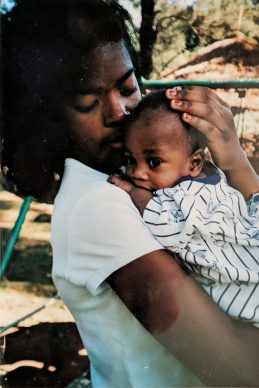
Ashley with baby Stephen in Uganda
What were the biggest challenges in joining?
Telling my parents and telling my family. I thought they would think it was weird. I knew it was for me—if President Hinckley had gotten up and said “This isn’t real” I would have thought “I don’t believe you!” It doesn’t matter if everyone who ever taught me changed their mind, I wouldn’t care. My mom said there’s no such thing as a black Mormon, and I said, “There’s going to be!” But we both knew that wasn’t true. We were both familiar with the Genesis group at this time, and also I had just seen a bunch of black people get baptized in Africa. There just weren’t black Mormons in Utah, but there are now. That was hard, telling my family, but they were incredibly supportive. They were both there. My dad spoke at my baptism, and he chose the man who would baptize me.
You said that were studying acting at the University of Utah and taught theater in Uganda. When did you know you wanted to be an actor?
I was about six. I was by myself in my attic room in Germany, and I was watching the Oscars on a little tiny TV. I remember thinking I am going to do this. But it wasn’t that I wanted to win an Oscar, it was that I wanted to be an actor, that I could do it as a job. It was going to be that or be a lawyer or a pediatrician. It would be one of those things. We had very limited cable, so my grandmother sent me a VHS of Wizard of Oz, Mary Martin as Peter Pan and An American in Paris. I watched those three movies on repeat.
You were recently on Broadway playing Annie in The Play That Goes Wrong. How did that come about?
All sorts of ways. I would be dishonest if I didn’t say my husband and I were fasting for me to find a job that I felt comfortable in and that could provide for my family. There were some issues with my side jobs. I am very fortunate; I have a manager and an agent, and I have the opportunity to audition a lot. But auditions aren’t jobs. I asked my husband for one year in New York to try and make acting work. I had several Broadway auditions that were going well, but I needed a booking. The Play That Goes Wrong was not what I thought it would be. My goal was just to go in and do a good job so casting would call me in again for the next part that I was right for. I thought there was no way that I was going to get it. It wasn’t until final call backs that I started feeling like it might actually happen. But, I told myself to not get excited, that there was no way it was going to happen. But then it did, and it was wonderful.
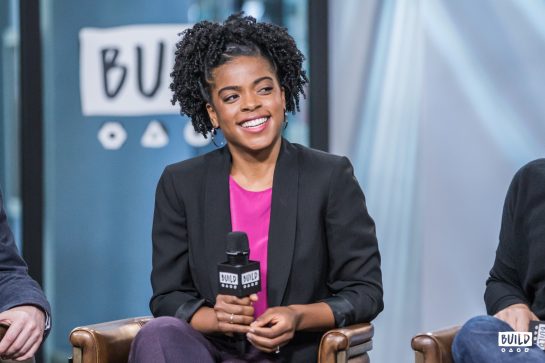
Ashley Bryant Miller
You were part of the “Be One” broadcast celebrating the 40th anniversary of the 1978 revelation on the priesthood. You’ve got this crazy schedule on Broadway and everything else in your life, and then you get a call…
Yes, I got a call. I had done a couple of years in Nauvoo playing Jane Manning James at the Nauvoo Pageant.
What did you learn from that? I do believe when we take on those stories we learn from them.
I’m still learning from Jane Manning. A couple of things—it’s okay for the journey to be ugly and really uncomfortable. Jane herself, being a black woman and having the journey she had—I couldn’t get that from anyone else. Only she could teach me to be faithful even in ugly, even in uncomfortable, even in confusing.
And that my relationship with Heavenly Father is first. It just refortified that for me. Go straight to the source in times of need. Don’t go sideways, go straight to the source. What a blessing in our faith that that’s what we believe. We teach that. We certainly counsel with our ecclesiastical leaders, but we know that we can receive direct revelation from the source. What a gift. I don’t need to look around me.
I want to acknowledge that your story doesn’t represent all black Mormons. It’s not your job to teach white people how to talk about this. I appreciate hearing your story and perspective.
When I got the call for “Be One,” I’d been thinking a lot about race and what it meant to be a black woman, a black member of the church, a black wife with a white husband, having this large white family I’d married into. I’d been thinking about it a lot. I wondered why I was spending so much time thinking about it. I know I’m black. I love being black. I feel very secure and good. Why am I thinking about it? Of course, there was our social and political climate—Dave and I got married in 2016, but it just kept coming up for me. It makes sense now that I was being prepared to do “Be One,” I needed to be thinking about these things.
So, they asked me to do it and then I didn’t hear anything for a few weeks. The production team had been working with a group of narrators who weren’t actors, and they weren’t meant to be. I was the only narrator who was also an actor.
I think that’s what led to its sincerity.
Yes, they told me multiple times that they could’ve had journalists and all actors, and broadcasters. They could’ve done it with all performers.
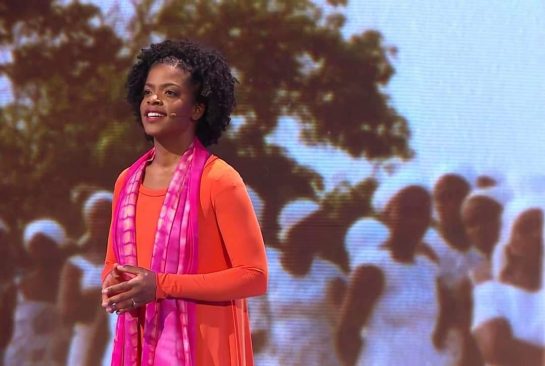
Ashley performing at the “Be One” celebration of the 1978 revelation on the priesthood.
As I watched “Be One,” I thought, this is somebody who knows how to perform. But you were still sincere. It was beautiful, I heard your testimony, and it was very clear that you were a trained stage performer.
I can’t pretend that I don’t know how to stand in front of a group perform. But sharing my testimony through the narration was the job. “Be One” was not just meant for the White Latter-day Saints or Black Latter-day Saints, or African and Latino Latter-day Saints, or Latter-day Saints. It was meant for everyone, which makes it hard because you have to speak a bunch of “languages”. Testimony is universal.
It has made me so empathetic to our leaders who speak at conference. It’s a tall order and I’m learning to withhold judgment when a talk doesn’t resonate. They are speaking to a worldwide audience. They know a lot of individuals. Imagine how you speak in church, and you think—I know this particular sister is dealing with this, and this particular sister is dealing with this, and this brother—and let me make sure that when I talk about this topic that I include those three. Now imagine that that’s the world. How do you do it? So, I think we can relax and just try to keep that in mind, before taking issue with the “imperfect conference talk”
Are there things that I think we could have been a bit more bold with, language-wise in “Be One”? Sure. Absolutely. But having talked to people in my own ward who haven’t even heard the name Jane Manning, people that don’t know some of the history of the Church, maybe it wouldn’t have worked to be more bold? Some people just needed the basics. Some people were only prepared to hear and digest the basics.
What kind of support did you receive from people as you prepared for this broadcast?
That was a big one. My husband, Dave, came along with me, that was crucial. I kind of thought that my life would slow down when I got married, and the world of wife would have to take over, and it has been the exact opposite. I feel like I can do more, and I’ve been asked to do more. It is so bizarre. I’ve felt our partnership, and that was a time that I really needed him and I think he learned a lot from the experience. I won’t speak for him, but I do feel like there was quite a bit that he learned, even with just relating to his family and relating to others. He was really my help meet—he was my partner. I needed him through this, because with my personality, even though I go to the source, I needed someone in person to bounce thoughts and feelings off of. It was a struggle, and he was amazing.
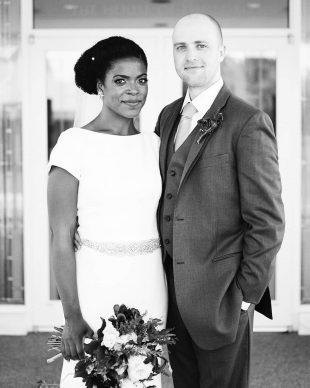
Ashley and her husband Dave on their wedding day.
Before watching “Be One” I was very skeptical and was surprised when even Elder Oaks said that he had struggled with some of the pre-1978 Church policies on race. What was your big takeaway from this?
I learned that nothing is going to change from the outside. I’ve watched other people be an example of this to me, and I was reminded of it. If there is something that feels so ugly that it needs to shift—I want to speak carefully here. Regarding Blacks and the priesthood, we now have scripture (a new heading to Official Declaration 2) that tells us that was a policy that changed. It is my personal belief that we may see other difficult policies change. I also took away that it’s ok to struggle with aspects of our church. And if there needs to be a shift, culturally or in policy, it is not going to happen if I sit back and fret about it. Nothing will happen. I have to be in it. We all do.
Again, this is just my story. I have a lot of friends that have struggled with their roles as women in the Church. I’ve never really struggled with those feelings myself. I have never felt more heard than I did while preparing for “Be One”.
You know how they say that the most important calling is your own? The ego in me is like of course it is! I was called to lead First Fridays (youth stake activities that happen on the first Friday of every month). The most important thing happening in the Brooklyn stake was First Friday, except when I was a seminary teacher, and then it was seminary. Now as Primary Primary President, nothing is more important that the children! I try to be all the way in. To talk about my calling like it’s the most important one I’ll ever have. I don’t feel any kind of “no one’s listening to me.”
That’s a big point of the MWP, we are grassroots based. Real change is showing up to the people you’re with, and we need to do that. I think that’s what President Nelson is saying in “A Plea to our Sisters.” Speak up! We need you!
Yes, speak up, we’re listening! Those pleas radiate, those go out. For example, this wasn’t the first “Be One” celebration. It has happened before. Gladys Knight sang in the Tabernacle—it was for the 25th or 30th anniversary—I was there. It wasn’t broadcasted, but people are talking about it. These things are being heard and now we have a broadcast! So everyone has access to it, it stays online and people can watch it. [Watch the “Be One” broadcast here.]
I think about women praying in conference. I think it’s a little strange that it wasn’t adjusted sooner, but people spoke up, and there you go. I believe that our leaders are doing their best. There are some whose words resonate with me more than others. Elder Holland is a journalist, he’s a storyteller, that’s what he does. He resonates. My dad was a pilot, so I share Elder Uchtdorf’s talks are the ones I share with my him. Because I think they’ll resonate. I like that there are so many leaders, I like that they are different. They are working through things with each other too, they don’t agree on every point, we’re getting there.
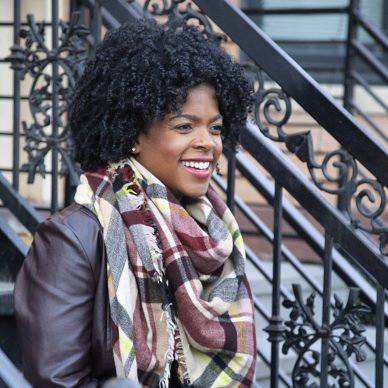
Ashley Bryant Miller
Is there anything else you’d want to say or share?
When I first heard the popular quote of Jane Manning, I was on the Trail of Hope—the trail in Nauvoo you walk down that leads to the Mississippi River. It’s the path that the pioneers took, and it tells their stories along that path. I thought it was maybe the cheesiest thing I would ever do, and in some ways it probably was, but it was the best thing I’ve ever done. One of my favorite opportunities to perform was being Jane Manning and sharing her words, “My faith in the gospel of Jesus Christ is as strong today, nay, if possible, it is stronger than it was when I first heard it.” At first, I thought what does that mean? It was confusing language to me. But now it makes sense. That is how I feel. My testimony felt strong when I decided to join the church, and it feels stronger now. I’ve had lots of uncomfortable and ugly moments being a member of the Church. It’s not easy at all. And I really wouldn’t want it any other way. I’m grateful for the opportunities as well as the challenges the Lord has allowed me to live through.
At A Glance
Name: Ashley Bryant Miller
Location: Williamsburg, Brooklyn
Marital History: Married
Occupation: Actor
Convert to Church?: 7/16/2002
Schools Attended: Yale University, University of Utah, Alta High School
Favorite Hymn: Because I Have Been Given Much
Personal Website: ashleybryant.net
Interview Produced by Elizabeth Ostler
